#its just these discrepancies and the awful plot lines
Explore tagged Tumblr posts
Text

My observations from s4 of Umbrella Academy
I dont even wanna talk about the main plot of whatever the fuck that car crash of a season four was, but heres some plot discrepancies I noticed while watching Umbrella Academy.
!! Season four spoilers under the 'see more' !!
- Luther's unnecessary body change
It's stated so clearly in s1 that Luther never gained his body from the marigold or developed it along with his powers. When he was up on that mission on the moon, he had an accident and Pogo had to donate his blood which resulted in Luther having that monkey body we all know and love.
So as Luther drank that said marigold, why would he suddenly gain back the blood donated from pogo and the body that comes along with that..? It's as if the writers themselves forgot why he had that body. Why write in unnecessary body dysphoria for my poor baby?
- Diego's sudden appearance of ab's
Listen. I am the last fucking person to complain about a Diego Hargreeves shirtless scene, where you see his pecs quite literally bounce BUT why did he change so drastically from 'dad bod' to suddenly 'ripped'?
I read an article interview with Steve Blackman and saw a few snippets from a podcast that explained that David (Diego's actor) didn't want to gain weight for the role, which is totally understandable. But if you have an actor who doesn't want to gain weight for this role, why not just keep Diego as fit?
Due to the short six episodes, it's extremely easy to miss how Diego slowly becomes more fit as time progressed. For most, and also myself at first, that fighting scene just looked confusing as fuck. Like two episodes before, Lila was calling you 'tubby' (or whatever the fuck she said), so why do you have abs now?? Where did the dilf diego dad bod disappear to :(
- Allison's beloved Ray just leaving her
I'm not sure if i'm taking this the wrong way completely but... In the scene after Allison had given Klaus the marigold against his wishes, but also to save his life. As Klaus is calling out every member of the family, he mentions how he 'took care of Allison when Ray walked out'.
Like i'm sorry but the fuck do you mean Ray just walked out?? Why did he leave Allison if she had no powers. She'd clearly built a better life for herself and began to change her mindset for the better, compared to s3 she's drastically better.
It's never explained (probably again for the lack of episodes) and it's never even mentioned again. Like does Allison share custody of Claire with Ray? Does Claire even see her father? I have so many questions and once again, a severe lack of answers.
- Klaus breaking his five year sobriety
As much as us as an audience are aware of Klaus' addictive tendencies and his utter thirst for form of drug in the former seasons, but why establish that he's not only been sober for three entire years but he's also now a huge germaphobe just for him to ruin it in five seconds.
The main problem I had with this is the fact none of the siblings, including and most importantly Allison, had zero reaction to this. They weren't upset, angry, disappointed or fuck it even happy. They practically ignored the fact their brothers three year detox went out the window.
Five's ability to time jump
Before I get you all jumping up my arse, i'm fully aware I could discuss how they completely just fucked his character development and his entire personality as a whole for a shitty romance that made absolutely no sense but I'm gonna make a separate post on that because oh boy do I have some shite to say.
ANYWAY.
I can't even go into much detail with this one but why is it that every time five attempts to do his time jumps, he ends up in that subway but when he does it with Lila in that end episode.. he can suddenly just jump..?? normally?? Like why. Why can he now only just time jump as he used too. WHY WAS THE SUBWAY NEEDED FOR OTHER THAN FOR THAT AWFUL FIVE X LILA PLOT????
It's as if the writers couldn't come up with a way to get the brellies into that building with Ben so instead of using critical thinking and writing them breaking in, they just said 'fuck it make him time jump with Lila'. Like no I have questions??

#umbrella academy im so disappointed and just overall let down by this#i honestly thought the ending itself was a good ending on its own#it was bound to happen ever since this cycle of ending the world began. they were the problem#its just these discrepancies and the awful plot lines#like why#diego hargreeves#umbrella academy#umbrella academy spoilers#umbrella academy season 4#klaus hargreeves#luther hargreeves#allison hargreeves#five hargreaves x reader#five hargreeves#diego hargreeves x reader#the umbrella academy
102 notes
·
View notes
Text
10 Lessons on Realistic Worldbuilding and Mapmaking I Learned Working With a Professional Cartographer and Geodesist
Hi, fellow writers and worldbuilders,
It’s been over a year since my post on realistic swordfighting, and I figured it’s time for another one. I’m guessing the topic is a little less “sexy”, but I’d find this useful as a writer, so here goes: 10 things I learned about realistic worldbuilding and mapmaking while writing my novel.
I’ve always been a sucker for pretty maps, so when I started on my novel, I hired an artist quite early to create a map for me. It was beautiful, but a few things always bothered me, even though I couldn’t put a finger on it. A year later, I met an old friend of mine, who currently does his Ph.D. in cartography and geodesy, the science of measuring the earth. When the conversation shifted to the novel, I showed him the map and asked for his opinion, and he (respectfully) pointed out that it has an awful lot of issues from a realism perspective.
First off, I’m aware that fiction is fiction, and it’s not always about realism; there are plenty of beautiful maps out there (and my old one was one of them) that are a bit fantastical and unrealistic, and that’s all right. Still, considering the lengths I went to ensure realism for other aspects of my worldbuilding, it felt weird to me to simply ignore these discrepancies. With a heavy heart, I scrapped the old map and started over, this time working in tandem with a professional artist, my cartographer friend, and a linguist. Six months later, I’m not only very happy with the new map, but I also learned a lot of things about geography and coherent worldbuilding, which made my universe a lot more realistic.
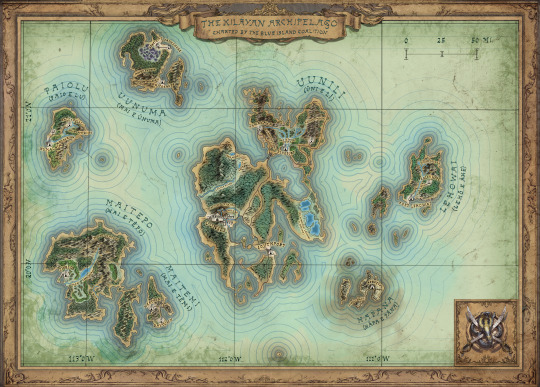
1) Realism Has an Effect: While there’s absolutely nothing wrong with creating an unrealistic world, realism does affect the plausibility of a world. Even if the vast majority of us probably know little about geography, our brains subconsciously notice discrepancies; we simply get this sense that something isn’t quite right, even if we don’t notice or can’t put our finger on it. In other words, if, for some miraculous reason, an evergreen forest borders on a desert in your novel, it will probably help immersion if you at least explain why this is, no matter how simple.
2) Climate Zones: According to my friend, a cardinal sin in fantasy maps are nonsensical climate zones. A single continent contains hot deserts, forests, and glaciers, and you can get through it all in a single day. This is particularly noticeable in video games, where this is often done to offer visual variety (Enderal, the game I wrote, is very guilty of this). If you aim for realism, run your worldbuilding by someone with a basic grasp of geography and geology, or at least try to match it to real-life examples.
3) Avoid Island Continent Worlds: Another issue that is quite common in fictional worlds is what I would call the “island continents”: a world that is made up of island-like continents surrounded by vast bodies of water. As lovely and romantic as the idea of those distant and secluded worlds may be, it’s deeply unrealistic. Unless your world was shaped by geological forces that differ substantially from Earth’s, it was probably at one point a single landmass that split up into fragmented landmasses separated by waters. Take a look at a proper map of our world: the vast majority of continents could theoretically be reached by foot and relatively manageable sea passages. If it weren’t so, countries such as Australia could have never been colonized – you can’t cross an entire ocean on a raft.
4) Logical City Placement: My novel is set in a Polynesian-inspired tropical archipelago; in the early drafts of the book and on my first map, Uunili, the nation’s capital, stretched along the entire western coast of the main island. This is absurd. Not only because this city would have been laughably big, but also because building a settlement along an unprotected coastline is the dumbest thing you could do considering it directly exposes it to storms, floods, and, in my case, monsoons. Unless there’s a logical reason to do otherwise, always place your coastal settlements in bays or fjords.
Naturally, this extends to city placement in general. If you want realism and coherence, don’t place a city in the middle of a godforsaken wasteland or a swamp just because it’s cool. There needs to be a reason. For example, the wasteland city could have started out as a mining town around a vast mineral deposit, and the swamp town might have a trading post along a vital trade route connecting two nations.
5) Realistic Settlement Sizes: As I’ve mentioned before, my capital Uunili originally extended across the entire western coast. Considering Uunili is roughly two thirds the size of Hawaii the old visuals would have made it twice the size of Mexico City. An easy way to avoid this is to draw the map using a scale and stick to it religiously. For my map, we decided to represent cities and townships with symbols alone.
6) Realistic Megacities: Uunili has a population of about 450,000 people. For a city in a Middle Ages-inspired era, this is humongous. While this isn’t an issue, per se (at its height, ancient Alexandria had a population of about 300,000), a city of that size creates its own set of challenges: you’ll need a complex sewage system (to minimize disease spreading like wildfire) and strong agriculture in the surrounding areas to keep the population fed. Also, only a small part of such a megacity would be enclosed within fantasy’s ever-so-present colossal city walls; the majority of citizens would probably concentrate in an enormous urban sprawl in the surrounding areas. To give you a pointer, with a population of about 50,000, Cologne was Germany’s biggest metropolis for most of the Middle Ages. I’ll say it again: it’s fine to disregard realism for coolness in this case, but at least taking these things into consideration will not only give your world more texture but might even provide you with some interesting plot points.
7) World Origin: This point can be summed up in a single question: why is your world the way it is? If your novel is set in an archipelago like mine is, are the islands of volcanic origin? Did they use to be a single landmass that got flooded with the years? Do the inhabitants of your country know about this? Were there any natural disasters to speak of? Yes, not all of this may be relevant to the story, and the story should take priority over lore, but just like with my previous point, it will make your world more immersive.
8) Maps: Think Purpose! Every map in history had a purpose. Before you start on your map, think about what yours might have been. Was it a map people actually used for navigation? If so, clarity should be paramount. This means little to no distracting ornamentation, a legible font, and a strict focus on relevant information. For example, a map used chiefly for military purposes would naturally highlight different information than a trade map. For my novel, we ultimately decided on a “show-off map” drawn for the Blue Island Coalition, a powerful political entity in the archipelago (depending on your world’s technology level, maps were actually scarce and valuable). Also, think about which technique your in-universe cartographer used to draw your in-universe map. Has copperplate engraving already been invented in your fictional universe? If not, your map shouldn’t use that aesthetic.
9) Maps: Less Is More. If a spot or an area on a map contains no relevant information, it can (and should) stay blank so that the reader’s attention naturally shifts to the critical information. Think of it this way: if your nav system tells you to follow a highway for 500 miles, that’s the information you’ll get, and not “in 100 meters, you’ll drive past a little petrol station on the left, and, oh, did I tell you about that accident that took place here ten years ago?” Traditional maps follow the same principle: if there’s a road leading a two day’s march through a desolate desert, a black line over a blank white ground is entirely sufficient to convey that information.
10) Settlement and Landmark Names: This point will be a bit of a tangent, but it’s still relevant. I worked with a linguist to create a fully functional language for my novel, and one of the things he criticized about my early drafts were the names of my cities. It’s embarrassing when I think about it now, but I really didn’t pay that much attention to how I named my cities; I wanted it to sound good, and that was it. Again: if realism is your goal, that’s a big mistake. Like Point 5, we went back to the drawing board and dove into the archipelago’s history and established naming conventions. In my novel, for example, the islands were inhabited by indigenes called the Makehu before the colonization four hundred years before the events of the story; as it’s usually the case, all settlements and islands had purely descriptive names back then. For example, the main island was called Uni e Li, which translates as “Mighty Hill,” a reference to the vast mountain ranges in the south and north; townships followed the same example (e.g., Tamakaha meaning “Coarse Sands”). When the colonizers arrived, they adopted the Makehu names and adapted them into their own language, changing the accented, long vowels to double vowels: Uni e Li became “Uunili,” Lehō e Āhe became “Lehowai.” Makehu townships kept their names; colonial cities got “English” monikers named after their geographical location, economic significance, or some other original story. Examples of this are Southport, a—you guessed it—port on the southernmost tip of Uunili, or Cale’s Hope, a settlement named after a businessman’s mining venture. It’s all details, and chances are that most readers won’t even pay attention, but I personally found that this added a lot of plausibility and immersion.
I could cover a lot more, but this post is already way too long, so I’ll leave it at that—if there’s enough interest, I’d be happy to make a part two. If not, well, maybe at least a couple of you got something useful out of this. If you’re looking for inspiration/references to show to your illustrator/cartographer, the David Rumsey archive is a treasure trove. Finally, for anyone who doesn’t know and might be interested, my novel is called Dreams of the Dying, and is a blends fantasy, mystery, and psychological horror set in the universe of Enderal, an indie RPG for which I wrote the story. It’s set in a Polynesian-inspired medieval world and has been described as Inception in a fantasy setting by reviewers.
Credit for the map belongs to Dominik Derow, who did the ornamentation, and my friend Fabian Müller, who created the map in QGIS and answered all my questions with divine patience. The linguist’s name is David Müller (no, they’re not related, and, yes, we Germans all have the same last names.)
#enderal#dreams of the dying#worldbuilding#resource#writeblr#writing tips#mapmaking#cartography#illustration#realism#writeblogging#novelwriting#writing research#research#writing
790 notes
·
View notes
Text
"Bellarke doesn't make sense," they say. They say because Clarke hasn't done anything that resembles romantic gestures toward Bellamy.
Conceding to march to her possible death in exchange for Roan sparing Bellamy's life. Obstinately fighting against Bellamy's stubborn wishes to remain outside the Ark while Praimfaya burns to the world to ashes. Shattering her soul by choosing 100 people to live and writing his name on the list, because he must survive. She can't have it any other way. Relinquishing 50 of those spots to Azgeda when Bellamy is captured and threatened, and Roan calls her bluff. Desperation driving her to the extreme to ensure the survival of the human race, yet unable to kill Bellamy to keep the bunker closed and the grounders from possibly killing Skaikru. Leaving the guaranteed safety of the fort to stay by Bellamy's side on the brink of global cataclysm. The bittersweet yet soft head and heart exchange she prompted. The hesitation in her last remark before imploring him to hurry.
4x13 ends six years and seven days post-Praimfaya with Clarke radioing Bellamy on the Ring. An activity she performs daily for six years. In any six years of my adult life, my only daily consistencies have been limited to breathing, eating, and sleeping. This girl is devoted enough to send her equivalent of love letters into the emptiness of space for 2,199 days. Season 5 opens with her trying to survive by herself in an apocalyptic wasteland. She spends her journey narrating to him her unvarnished struggles during the most traumatic experience of her young life to date. Her despondency. Her loneliness. Her agony. Her desperation. Her small victories. Her discovered treasures. Her determination. Her doubt. Her guilt. Her defeat. Her morbid self-reflection. Her relief and contentment. Her happiness. Her admission of missing him. She shares all of it with only him. Only he is permitted to know her to this depth. Not any of her other people on the Ring. Not any of her people in the bunker, a group including her mother. Not a spiritual communion to the great, big love of her life Lxa, situated on her throne in the high heavens and waiting for her trophy wife, for Clarke to stay connected to her dearly departed. Isn't that the sort of behavior that might occur by a bereft widow?
After finding an oasis to rest and call home, even after discovering a companion to build a life with, she continues with her radio calls. It doesn't matter that he never received her communications. The importance of the gesture- the intimacy of sharing her life and thoughts with him while he was gone- remains the same. The magnitude of her devotion to him made clearer through the absence of a single responding utterance.
She lovingly tells Madi stories of Bellamy as her hero. Gazing warmly, hopefully up at the stars as if she longs for her vision to cut through an endless pitch-black sky and find dark curls and freckled constellations from thousands of miles away.
"Bellarke doesn't make sense," they say. They say because post-Praimfaya ended with an established B/E.
As Clarke looks up at the stars, questioning if she'll see Bellamy again, we transition to our first glimpse of Bellamy after six years, forlornly looking down on Earth to the very spot of green where he is unaware of who is yearning for him to return to her. Contrary to Clarke, who is covered in warm firelight when thinking of him, he is colored in cold, muted greys and blue, no speck of warm hue. (The rhyming scheme was unintentional, but hey, I'm going with it.) Behind him, his family is sparring, but he's distant from them. He's trapped within this tin can, his arms folded, his body taut, not facing the view on the other side of the glass, but still enraptured by the sight of his home below.
We see what changes to the characters and their dynamics have taken place until, at long last, we uproariously cheer as Bellamy & Co. find a way to return to Earth, the sole event we've been anticipating for eleven months, to the point we could feel it at our fingertips, jittery and tingly. Bellarke reunion!! He's going to know she's alive! Yes! Finally!! Break out the champagne! We're celebrating, dammit! It's going to be so damn emotional! Authors start crafting mental fanfics. People are bouncing off the walls like bright, errant fireworks, unable to sit still. I can't believe it's finally happening...what do you think it's going to be like? Will he run to her? Will he be stunned and speechless? Will they sob uncontrollably?!? They'll be clutching the life out of each other! Another Bellarke hug!! The very best hug!!! They're never going to let the other out of their sight again! He's going to meet Madi! Mom, dad, and adopted preteen make three!!! There's no way they're not getting together after this!! He just got her back after six years of thinking she was dead!! The reunion's not going to happen this episode, but maybe next week, when do you think? You mean we have to wait seven days before----
B e c h o.
We stood on the precipice of what we agonized and crawled through for eleven excruciating months, only for an anvil to drop, and our heads to be clubbed. Our bodies fell through the floor, descending lower and lower with immense haste, to take up residence in the seventh circle of hell.
Do you think the framing of these events wasn't intentional?
Do you think the powers that be behind the creation of that calamitous bombshell for our protagonist, intended for us to root for B/E?
By us, I'm not restricting the effect of the blow to Bellarke shippers. The entire audience, casual and fandom alike, shippers and non-shippers, was meant to await this reunion. We were all meant to feel devastated by this revelation.
If they didn't want to invoke in us feelings of support for B/E at their inception, how in the name of all things holy is a purported B/E endgame your conclusion?
"B/E doesn't make any sense," they say, "when last we saw them, she was his enemy. Nothing more, nothing less."
Do I think their pre-Praimfaya status as antagonists rendered it impossible for B/E to have a convincing love story or sexual relationship?
I think, if Jason were so inclined, we could have gotten flashback Ring rendezvous of secret trysts between Bellamy and a googly-eyed, blonde-wig-wearing broomstick designated Clarke 2.0. So no, I don't consider B/E a deviation inherently outside the realm of romantic possibility. Jason is an artist, and this show is his canvas. He can give life to almost any whim he'd like in his work of fiction. Not only that, but B/E is also hardly the first pairing in this series modeled by the enemies-to-lovers trope.
"Bellarke doesn't make sense, they'd say, "absent any concrete evidence alluding to a romantic relationship." "Seven years running, and not a trace of romantic love," they'd conclude.
Remind me, what was B/E's sublime prologue into coupling up again?
Furiously choking the life out of an enemy in a fit of rage two episodes before revealing her as his new girlfriend evidently can be considered by some an adequate precursor to a sensational romantic relationship. But endangering Earthkru's lives by risking the wrath of two societies in refusing to let Clarke die, pumping her heart for her to stay alive while begging her to fight so she can come back to him, cannot be.
Either this show is quite the oddity, or it’s fandom's periodic knee-jerk, ass-backwards, charming zeal at play.
The lack of rising development is all the more reason why B/E's grand unveiling demanded perfection. Instead, our first insight into their union is overshadowed by Clarke and the impending Bellarke reunion. B/E isn't central enough to the narrative to warrant focus that would put to rest any discord of illegitimacy. But you know which pair of the two is concentrated on for seven seasons now? Three guesses...
But don't despair. Fandom has decreed, by its own appraisal, the shorthand of kissing and sex has rectified the discrepancy of a complete absence of pertinent on-screen development.
"It's not ideal storytelling," they say, "to exclude B/E's development. But The 100 has historically been a plot-driven, fast-paced, contained drama. It has always evaded expanding on character dynamics to fans' satisfaction.”
The writers have done more to present Josephine and Gabriel as soulmates with less airtime than B/E ever had in total. They don't lack the skill or time to fortify B/E in anyone's mind as the central romance. Jason made a conscious choice not to. Why would he? Does he think the endgame love story of the show's deuteragonist doesn't merit attention to detail by the writing? Or does it seem more likely, it was never his intention for B/E to cross the finish line?
And, for a plot-driven, fast-paced, contained drama, they sure have an awful knack for finding the time to showcase Clarke's kicked puppy reactions to an embracing B/E. We've had three thus far. One for science, one for emphasis, and one to say, "Do you people get it now?"
"Bellarke doesn't make any sense," they say, "if they wanted each other, they'd have gotten together by now."
A long time ago, someone stated, "Lovers are supposed to do that you know and if they don’t do that it means their relationship isn’t romantic if sexual intercourse isn’t added."
And to that, I posed the question, "Where exactly is it written that "if a pairing is not made canon by season [insert arbitrarily chosen number here], it will never be made canon, period?" Was I just absent from fandom class that day and skipped to the lesson on slow-burn ships?" We are going into the final season, and I stand by this question today as I did then. Bellarke could refrain from physical expressions of love and candid confessions to season 17, and their journey could continue to exemplify a love story. Because the absence of either one doesn't preclude two people from falling in love. Nor does the inclusion of either one necessitate two people falling in love.
"Bellarke doesn't make any sense," they say. They say because Bellamy is her dearly beloved, but platonic, best friend.
Well, you've got me there. I'm stumped. How can it be possible for friendship and romantic love to behave as anything but mutually exclusive concepts? It's not as if friendship can be contorted to serve as a foundation for love.
The cornerstones of strong friendships include trust, care, support, devotion, and many other features of a similar nature. Love- deep and genuine love, that is- involves frequent kissing and passionate, vigorous sex. The wilder the display, the stronger the pairing. The dozens of couples, love interests, and sexual liaisons before B/E who have kissed and had sex before dying must not have first consulted the manual for proper protocol.
And the inverse? Once two people fall in love, they cannot fall back to say, a familial connection. No, no, no. Such a regression would be the work of a tragic, reprehensible flaw in the cogs of the universe. Speak nothing of it.
"It doesn't make sense for B/E to break up," they say, "when B/E has stayed together for two seasons sans any indication Bellamy loves Clarke more than Echo, enough to want to leave his loving girlfriend."
How many times has Bellamy tried and failed to honor his commitment to Echo? How many weak attempts are met with a corresponding scene of Bellamy shifting his attention to the girl he tells himself to get over?
Echo leaves for Shallow Valley, his focus immediately turns onto persuading Clarke not to leave his side. He symbolically chooses Echo in the fireside scene by touching her sword. Yet, he looks at his girlfriend for the first time since their separation with the most aloof expression unsuitable for the occasion. No hope to be found anywhere. They share a brief reunion hug, no time for intimacy. He is reunited with Clarke and casts a nervous glance at Echo when bombarded with Clarke's appreciative gaze. Still no time for intimacy between B/E before a decade-long nap, but time can be carved out for a warm, flirty Bellarke reconciliation, complete with intensive heart eyes. No inspired, emotionally wrought, double sunlit embraces for B/E. If Bellamy is going to look out of a window at his future home, he'll either be by himself or snuggling Clarke into his side. There's no place for Echo in the lock of his arms anymore, only room for flanking him in the way loyal lieutenants tend to do. His girlfriend glances over at him as their exploratory team roughly plummets to new territory, and he does the same at Clarke. B/E reconnects lakeside, him asking for a swim with her and leaning into her arms at a campfire. He sits by her side on a swing set, amidst talk of moving their people into an abandoned village. And it's all well and good for B/E, right? They're presenting the front of a happy, unified couple.
Until...Clarke walks away behind his sight, and he leaves Echo's side to seek Clarke's missing presence where the flirting and warm gazes and near confessions are kicked into overdrive. He calls Echo to hear his latest discovery, then proceeds to ignore the hell out of her, communicating exclusively to his co-leader. He stares wistfully at Clarke dancing with her new flavor of the night, cannot stop doing so even while excoriating Echo for her stoicism, expressing his frustration at her inability to fulfill his emotional needs.
He recommits to Echo, as Clarke is kidnapped and her body is stolen, with nary a transition, suggesting we are meant to link the two incidents together. For all his resolve to face the future with Echo, he spends the whole of the next episode with a wary eye on Clarke, to the point that he is the first to realize Clarke is not herself. In the ensuing arc ranging from 6x05 to 6x11, approximately half of the season, what was B/E, again? Was that a thing concurrently happening with Bellamy's Operation: Save My Clarke? Because I seem to be able to recall only Bellarke goodness. Oh, my mistake, there was the consoling hug which, oddly enough, did nothing to soothe him. As evidenced by his choice to grieve alone. No girlfriend he wanted close by for comfort, knowing clear as day she couldn't provide it if she tried. Not with who he just lost.
B/E gets another brief reunion hug, the majority of which is spent with him peering at Clarke. The show saw that hug and raised us an Austenesque-quality counterpart that would do Elizabeth Bennet and Mr. Darcy proud.
"B/E endgame is the only sensible outcome," they say, "they love each other so much."
I don't contend they don't love each other. But we are shown two people determined but incapable of snuffing their deep-rooted feelings out of noble propriety, and most importantly, out of needless fear of unrequited love. And another two people who sought- and failed- to keep grasping the wisps of a gentle relationship slipping out of their hands since they left their comfortable space bubble. For anyone in this conundrum to be happy, the only natural course of action is for the latter to call it quits. The writing has been on the wall for too long.
Maybe a single Bellarke scene plucked out of the lineup can be interpreted on its own as platonic buddies being platonic buddies. But when all those individual moments are woven together, what forms is an ornate tapestry with a pattern so vivid, any inane rhetoric involving a hint of the word "platonic" is little more than ludicrous anti drivel transparently cooked up by those wishing a different endgame.
I hope you've enjoyed my second long-winded rant, @sometimesrosy, @jeanie205, @travllingbunny. One born of a teaching moment in which I learn for the umpteenth time it's best to steer clear of Twitter.
268 notes
·
View notes
Note
2, 5, 9, 13
2: Do you focus on attention to detail when you read fics? Are you more or less attention to detail focussed when you write fics?
when i read? ehhh, fairly? there are some pet peeves i have that are in the grand scheme of things, inconsequential and tiny little details (zim isnt allergic to WATER hes allergic to the POLLUTION IN THE WATER) but other than that its just, i dont notice any "discrepancies" ig on my first go-around but if i read, say, a multichapter multiple times i start to notice things like character inconsistencies and plot holes, but if i read it that many times it means i already love it, and those things wont stop me from liking it still
and my fics have way too much fucking detail in them i could make a whole post about the music scene in annexed. im making a conlang. someone stop me. the weird thing is i have a good deal of oneshots that bank on Telling You Fucking Nothing (trials, for one, and one im sitting on for now)
5: Share a snippet that you’re proud of from an upcoming fic/chapter.
i love u first off. theres a line from a fic called hum that im really proud of but it doesnt really make much sense without context
but this paragraph from The First Annexed Fic is good i think
The thing could easily be described as being the size of an Earth cantaloupe— but, since Red didn’t know what either of those things were, he internally described it as about the same size as one Irken egg. It was a dark plum color, darker than the pictures he saw in smeet school, with darker flecks all over it. It resembled its layer with an uncanny similarity that left Red in awe— there was no denying the thing was a product of his own biology, as he gaped at it in the Medic’s arms, small and innocuously holding a little life inside of it, blissfully unaware of the implications of its existence.
9: Are there any fics you’d love to see but don’t want to write yourself? What are they?
more razr? more fucking razr? spare razr anyone? or razf. please. why doesnt anyone write rapr anymore either all the good fics r from like, the 2010s
13: Do you prefer writing multi-chapter fics or single-part fics? Do you prefer reading multi-chapter fics or single-part fics?
this one is a very "it depends" thing, honestly. i sure do prefer thinking up long multichapter epics (like annexed) but i have more fun with quick n dirty oneshots but its like. fuck it! im gonna do annexed anyway and i think ive found a style that basically makes every scene kind of like a oneshot so theres that at least? wrt reading, i love me a good multichapter but some multichaps kinda lose me at some point, but some are fucking amazing! even when i like a multichapter, theres usually a part i deem my "favorite" and i just read that chapter/those chapters over n over again lmao, take of that what you will
5 notes
·
View notes
Photo
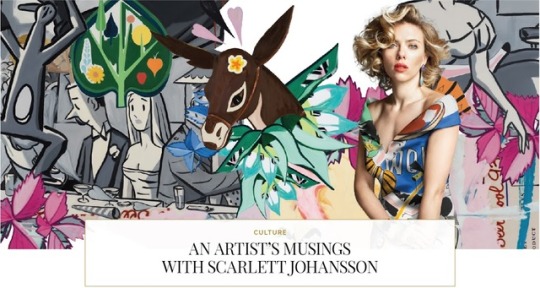
Scarlett Johansson Controversy Reveals How Terrible We Still Are at Thinking Through Issues of Racism and Representation
It was so bad, even the hosts of The View had to weigh in.
The topic: Star actress Scarlett Johansson’s steadfast belief that she should be able to play any character she chooses as an artist without enduring a backlash rooted in “political correctness.”
But worse than revealing Johansson’s mistake of standing fiercely in a bubble of privilege, her comments in a recent interview also show how, every few days, a controversy erupts that shows how little most people understand about how to think through issues of racism and representation in America.
And it’s crippling our ability to talk about it.
youtube
Johansson’s quote, dropped during an interview as part of an As/If magazine cover shoot, sounds relatively innocuous. “You know, as an actor I should be allowed to play any person, or any tree, or any animal because that is my job and the requirements of my job…There are a lot of social lines being drawn now, and a lot of political correctness is being reflected in art.”
Those lines take on a more ominous tone, when you recall that Johansson has taken a fair amount of criticism for a couple of choices; playing the lead character in the live-action film of Japanese anime franchise Ghost in the Shell and initially agreeing to portray a transgender character in the film Rub and Tug (before public reaction pushed her to relinquish the part).
She took a lot of criticism online, including from me. I tweeted: “One definition of white privilege is being able to pretend the advantages you have -- in this case, an industry full of executives who will let you play any characters you want in a way they don't for actors of color -- are just an exercise in fairness.” That post drew 2,800 retweets reaching over 263,000 users.
Still, Johansson’s position is an easy one to embrace. Isn’t equality in Hollywood reached when anyone can play any character, regardless of identity?
Unfortunately, no. And the answer to that conundrum lies in the peculiar dynamics of representation in movies and TV shows.
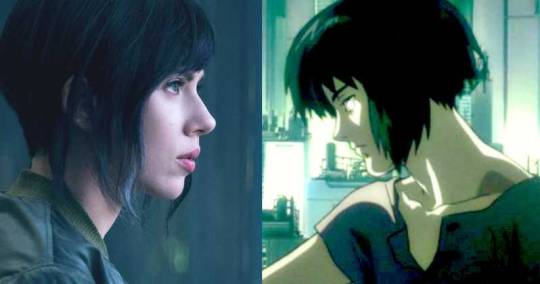
(At left: Johansson as Mira Killian; at right: Major Motoko Kusanagi.)
Let’s use Ghost in the Shell as an example. It’s a film based on a Japanese manga comic that is steeped in Asian culture -- from its costumes to the look of the futuristic city where it takes place to the names of many characters. Johansson plays Mira Killian, a person whose human brain was placed inside a cybernetic body; at the movie’s end – Spoiler alert! -- it is revealed that Killian was actually a woman named Motoko Kusanagi.
Okay, anybody who’s actually seen Ghost in the Shell knows I’ve left out a lot of plot details; I don’t think they’re that important for this discussion. What is notable, however, is that by casting white actors like Johansson, Michael Carmen Pitt and Pilou Asbaek in major roles, Ghost in the Shell becomes a film centered on Asian style and culture where Asian actors are pushed to the sidelines.
Something similar happened with Marvel’s movie about a superhero sorcerer, Dr. Strange. The character who serves as Strange’s mentor, The Ancient One, is Asian in the comic books. But he was also a horrific collision of Asian stereotypes. To avoid that problem, Tilda Swinton was cast as The Ancient One and given a new backstory as a bald, Celtic woman.
So Strange trains with The Ancient One in a city in Nepal, inside a building that looks like a pagoda, wearing clothes which seem strongly inspired by what samurai might have worn. But only one major character is Asian. Once again, a movie has usurped the historic style, look and mysticism of Asian culture but placed white actors at the heart of the action.
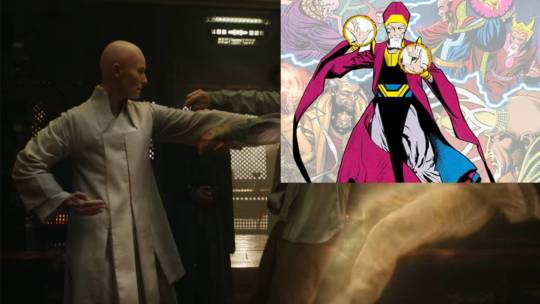
(At left: Tilda Swinton as The Ancient One; at right: The Ancient One in comic books.)
Contrast these two examples with the latest season of HBO’s True Detective. Creator and showrunner Nic Pizzolatto has admitted he originally intended to cast African American actor Mahershala Ali as the main character’s best friend in the show’s third season. But Ali convinced Pizzolatto to rewrite state police detective Wayne Hays as a black man and give him the part.
Hays also has an African American wife and son, adding more diversity to the cast. His ethnicity also gives the story added dimension, as Hays fights racism and his ineffectual superiors to chase down the perpetrator of an awful crime.
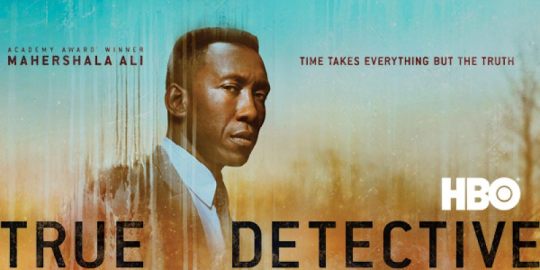
This isn’t always the case. But often, when white actors are cast to play characters of color – or cis gender actors are hired to play transgender people – those actually depicted are marginalized. They are not allowed to tell their own stories, though the exotic flavor of their culture may be used to spice up costumes and locations. Instead, white characters sit at the heart of their stories, just as they do in many other corners of American life.
On the other hand, when non-white and transgender actors are hired for roles which might have been written for white and/or cis gendered characters, the result is often an expansion of diversity. People who were once relegated to the sidelines get to stand in the spotlight. They can also be humanized – like the judge played by transgender actress Alexandra Billings on Amazon’s legal/crime series Goliath, whose storyline has nothing to do with her gender status. Stories of romance (Crazy Rich Asians) or chosen family (FX’s Pose) gain new urgency because of their authentic and culturally specific roots.
This goes beyond an individual performer’s right or ability to play a specific role. It’s about how a single casting choice can change the entire statement a film makes about certain groups of people or their culture. It’s an impact many people don’t recognize right away, because they are used to talking about diversity and equality in more simplistic terms.
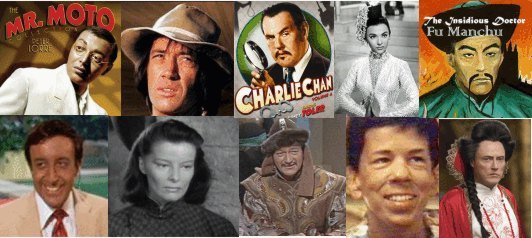
(Examples of white actors playing Asian characters, known as “yellowface,” through the years.)
After the social media explosion, Johansson issued a statement published by Variety, in which she said her comments were “edited for click bait” and “widely taken out of context.” She also nodded to the idea that the industry hasn’t been fair in casting non-white or transsexual actors: “I recognize that in reality, there is a wide spread discrepancy amongst my industry that favors Caucasian, cis gendered actors and that not every actor has been given the same opportunities that I have been privileged to.”
She didn’t explain how to eliminate that discrepancy, given her belief – articulated in the same statement -- that “Art, in all forms, should be immune to political correctness.”
I can understand why Johansson may be weary of bearing the brunt of these discussions. After all, there are producers, a casting director, an overall director and studio executives who often sign off on who gets a role. When controversy erupts, their name isn’t in the headline of a tough column.
But I often liken weaning Hollywood of its prejudicial tendencies to training a pet. Sometimes, you have to use negative consequences -- shame, embarrassment, boycotting -- just to get everyone’s attention.
Eliminating Hollywood’s preference for casting white cis gendered actors requires bold challenges. It requires asking: Will this casting change exclude rather than include? Can we embrace racial, cultural and gender complexity rather than avoid it?
It requires looking past simplistic notions of equanimity to see what true equality looks like in the real world.
And it probably requires telling highly-paid, accomplished actors like Johansson some version of that old saying: “When you’re accustomed to privilege, equality feels like oppression.”
9 notes
·
View notes
Text
Zuko & Mai’s Constant Characterization Change
Warning this has anti tags. Read at your own risk. I don’t want to hurt your feelings with my rantings.
I laugh Zum@i. It’s better than M@iko.
It sounded like siomai…

YUMMM!!!
Unlike the food it rhymed though, Zum@i is not that palatable. It’s edible, but its edibility is debatable. Just look at how it’s made:
The Awakening – written by Aaron Ehasz
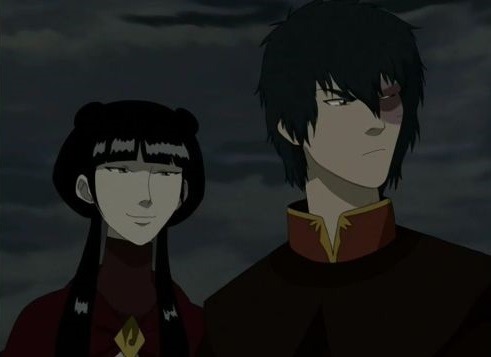
Zum@i was served in the story at the very start of Book 3 in The Awakening episode written by Aaron Ehasz, a prominent Zuko writer, so we can be sure this was an in character Zuko. In here Zuko is introspective and solemn. Totally in character after what happened in the Book 2 finale. Mai too was in character with her Book 2 personality. She likes Zuko but she still is sarcastic and cold. She isn’t sappy just by being around a guy she likes.
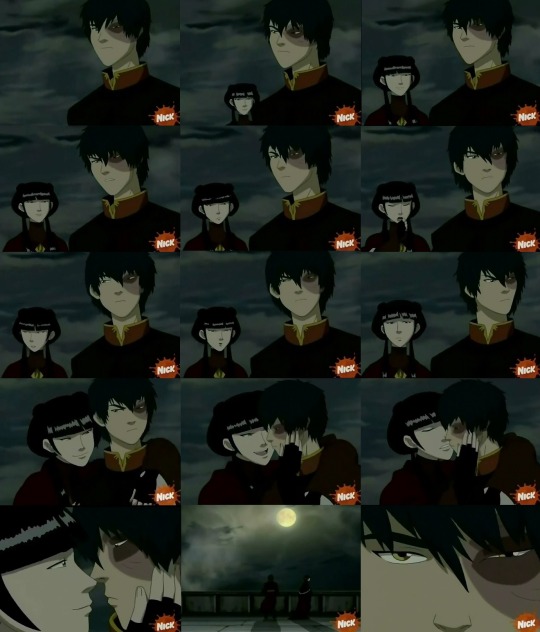
And witness how they interact. Mai approached Zuko who’s contemplating then. Zuko tried to open-up to her but the small talk got her bored (it’s only been 20 seconds and she already got bored) which miffed Zuko. Mai brushed it off by kissing him. Zuko let her but he remains silent and expressionless after she left. Their interaction didn’t faze him from his thoughts. Mai comes out strongly and assertive while Zuko is detached. Both of their actions and responses in this scene are in-character with the previous episodes in Book 1 and 2.
The Headband – written by John O. Bryan
It’s a not really a good episode following The Awakening. Just look at Zuko. Remember how silent and passive he was around Mai last episode or just how nervous and oblivious he is on his date with Jin on The Tales of Ba Sing Se episode in Book 2. Well look at him now.
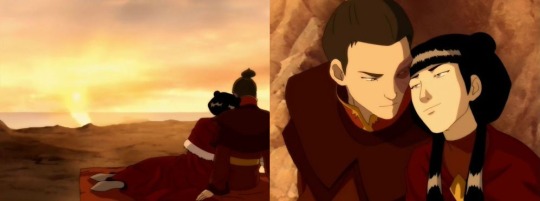
Nice Zuko fans explained this as Zuko trying to emulate Ozai. I guess that would be the Watsonian point of view. But I just… can’t agree with that. I’m leaning into Doylist. It’s the writer’s doing. However you want to imitate someone, you just don’t change overnight. And since when did Zuko become that great of an actor anyways?
It’s like Zuko had seen Ozai coming from the imperial harem (Is there even an imperial harem in the Fire Nation palace?) with ladies in his arm and being very suave about it. Better yet Zuko had seen Ozai having a picnic with a lady, on a sunset by the sea, and being very smooth about it and Zuko was like: “That so cool I’m a try it with Mai.” Now I’m imagining this:
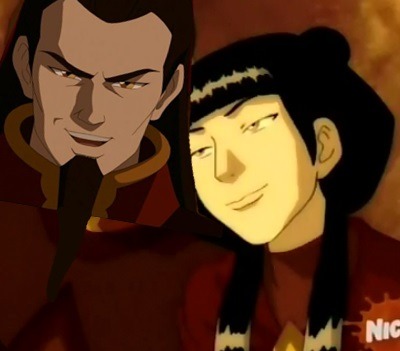
(Apologies for the editing, I’m not good at it.)
And what’s more is why the heck was Zuko emulating his father in his dating life. Oh… right he didn’t just copy Ozai when his smooching with Mai, there was also this Combustion Man business. This reminds me:
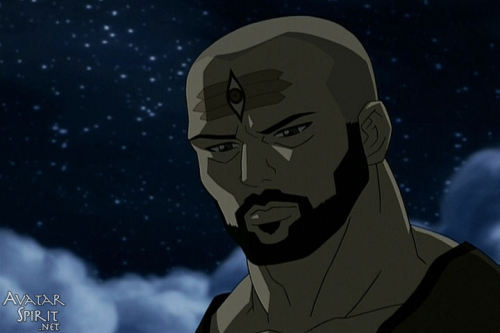
Here is John O. Bryan’s ‘idea about Firebenders combining their concentrated mental power to create nuclear explosions.’ Furthering by Bryan Konietzko’s ‘a Firebender who blows things up with his mind idea for an assassin that Zuko hires to kill Aang.’ These people think this is a really cool villain...
THE COMBUSTION MAN IS BARELY EVEN A CHARACTER!!! They didn’t even put a lot of thought into him. No name, no speaking line, no explanation of how or where Zuko finds him, no explanation how he’s able to track Aang, no explanation why he wasn’t hired a long time ago by Ozai or Zhao or Azula if his so effective. His just… his just there… because… because they said so… ah… no, because of plot.. Yes... that must be it... Right?
Did this whole writing team ever talk to one another? Are they ever aware about the other writers’ characterization and development of Zuko? Because you know it is unbelievable for Zuko to hire an assassin. Looking back at Book 1, even when he was trying to please his father and earn his love, it never felt like Zuko was trying to emulate him. This and this post would better explain that.
Don’t even get me started with the whole confused thing and going to Uncle Iroh and demanding. I just chalked it up as since Zuko was depressed he must be on medication. He must be taking TCAs causing cognitive impairment.
But you know which Zuko John O. Bryan had written in this episode?
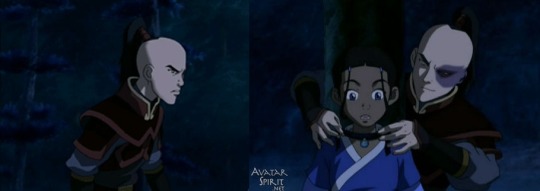
Yes, it was the I’ll-save-you-from-the-pirates Zuko. The wrist-grabbing, tree-rounding, suavely-talking I’ll-save-you-from-the-pirates Zuko devoid of any development and further characterization the other writers had put into him.
And what do you know The Waterbending Scroll episode was the first episode where John O. Bryan had written Zuko. And weren’t this writer and the show runners always defined Zuko as a Bad Boy. Well he was certainly written in The Headband episode as one.
It makes sense to write Zuko like this in The Waterbending Scroll back in Book 1, but this kind of characterization doesn’t fit well after what he had undergone passed that The Waterbending Scroll episode. This interpretation creates quite a discrepancy from The Awakening episode Zuko.
Then there’s Mai.
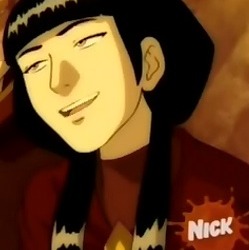
This Mai had a semblance of The Awakening Mai. She just wanted to kiss. But she still feels different from the previous one. I don’t know why but this Mai just feel so sappy compared to Aaron Ehasz’s I‘m-getting-bored-let’s-just-smooched Mai. So I’m calling this John O. Bryan’s Mai as Happily-clingy-sappy Mai.
The Beach – written by Katie Mattila
Ah… what can I say? It’s just weird. This is a really weird episode. It felt like it didn’t belong to the series.
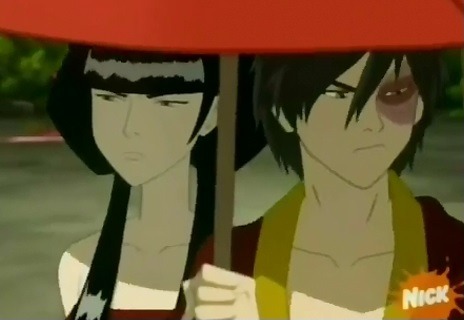
Here are Zuko and Mai going out just like in the previous episode we’ve seen them together. Unlike that episode though, they didn’t seem so happy with each other.
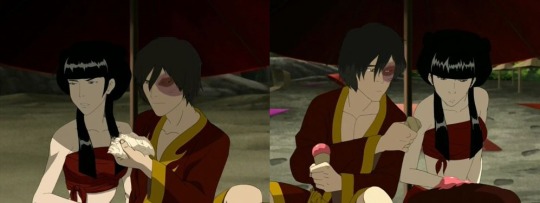
And what’s this, Zuko making mistake. All of a sudden he’s not charmingly flirting with Mai like You’re-so-beautiful-when-you-hate-the-world John O. Bryan’s Zuko. Gasp!!!
But this Zuko seems familiar.

That’s right! This was The Tales of Ba Sing Se Zuko written by of course, Katie Mattila too. The one on his date with Jin. I’m actually fond of this Zuko. This is the Clumsy-clueless-considerate-date Zuko.
And what about Mai, all of a sudden she seems to cool to care.
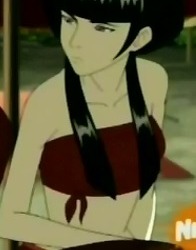
This Mai was written like the Book 2 Mai, but with an apathy that transcends to her dating life. Quite a big contrast with John O. Bryan’s Happily-clingy-sappy Mai, this Mai is just too hard to please. I mean Happily-clingy-sappy Mai was having a picnic in the sunset overlooking the sea. Albeit she was saying the sunset looks awful back in that episode just like Katie Mattila’s To-cool-to-care Mai is saying about the shell in this episode, John O. Bryan’s Mai wasn’t dismissive of Zuko compared to Katie Mattila’s Mai. Aaron Ehasz’s I‘m-getting-bored-let’s-just-smooched Mai too in The Awakening episode wasn’t dismissive of Zuko... Alright maybe she was dismissive of his feelings, but that version of Mai was crystal clear in what she likes. She likes Zuko. But this episode’s version of Mai... she likes… did she even like Zuko… she must have forgotten… or Zuko just grates on her nerves… She however grates on the nerves in this episode. What’s her problem? PMS?
That’s why The Beach episode created quite a disconnect from the previous episodes that features Zum@i. I mean just imagine John O. Bryan’s I’ll-save-you-from-the-pirates-you’re-so-beautiful-when-you-hate-the-world Zuko and Happily-clingy-sappy Mai in these scenes:
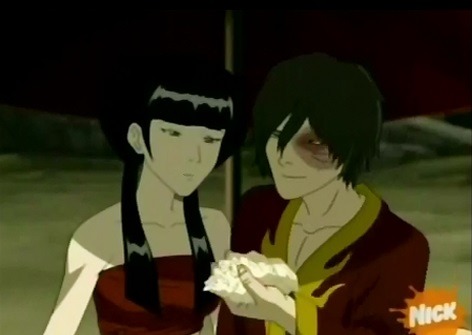
Zuko: [Picks up shell and turns to Mai.] Here. This is for you. [Offers it to her.] Mai: That shell had such an awful shape. Zuko: [Snickers.] You're so beautiful when you hate the shape. Mai: You don’t have an awful shape. [Then they kiss.]
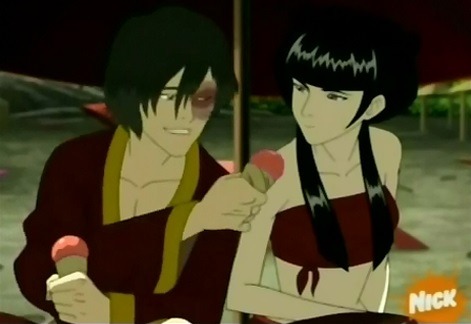
Zuko: I thought, since it's so hot... here. [Offers an ice cream which didn’t fell out into Mai's lap.] Mai: [Licks the ice cream which didn’t fell out into her lap.] Thanks. This is really refreshing. [Then they kiss.]
See the difference. I laugh Zum@i. (On another note, do you know how difficult it is to edit Mai’s face to neutral in these scenes? This episode’s version of Mai was just frowning the whole time. As I said she just grates on the nerves in this episode. The Bitch?)
Nightmares and Daydreams – written by John O. Bryan
Hey, it’s John O. Bryan again. You know what this means. This means saccharine Zum@i scenes.
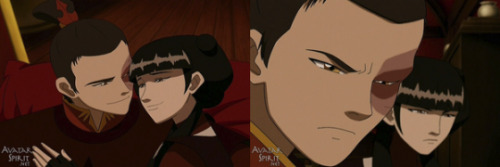
Oh, what’s this? It seems like John O. Bryan caught up with the notion that Zuko had a character development passed The Waterbending Scroll episode.
Oh well. But hey, there’s still Happily-clingy-sappy Mai. She’s not so happy though. Zuko had apparently got a development she’s not even aware of. Oh… and they didn’t even kiss. Still the characterization of Mai is consistent with The Headband episode.
The Boiling Rock, Part 2 – written by Joshua Hamilton
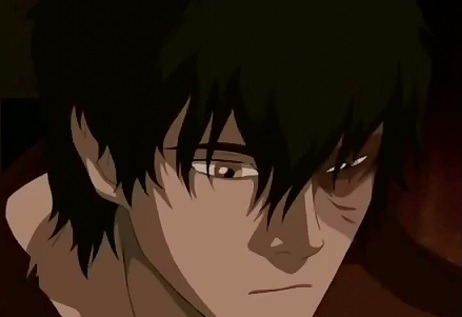
Well what can I say? Joshua Hamilton had written Zuko objectively. It’s the same Zuko he had written from The Cave of Two Lovers and The Chase episodes. It’s the same Zuko from the Ehasz couple written episodes. It’s the Zuko with empathy and conviction.
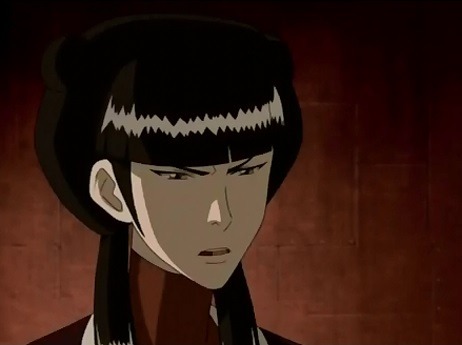
Mai too, he had written with resembling the Mai from The Awakening episode. She didn’t want to hear Zuko’s side on their confrontation scene. She didn’t want to understand.

‘I have no ears to spare, save it Zuko to whoever cares.’ She made a heroic save though at the end.
Sozin's Comet, Part 4: Avatar Aang – written by Michael Dante DiMartino and Bryan Konietzko
And here I thought I’m finished. What’s more is that, after The Boiling Rock, Part 2 episode I thought Zum@i was finished. Apparently, it’s not. I’m not going to comment about how these two show runners write Zum@i.
It’s nice… not really… no.
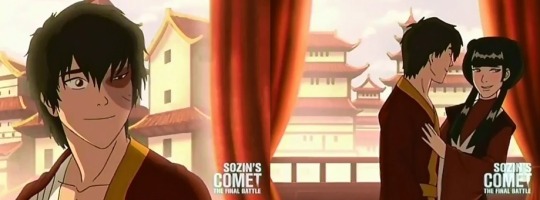
Just look at this Zuko and Mai. Never seen those two interact like that with each other. It’s either smirking or frowning… Openly smiling with each other… Mai blushing… that’s just… scary. Okay this version is freaking me out. I just can’t… Can it be that they’ve been lobotomized?
Ah… missed chances. Zum@i missed its chances. I mean it was introduced in Book 3 which theme is Fire which equivalent to the summer season. If they had broken-up in The Boiling Rock, Part 2 episode… or fine… in this last episode, Zum@i could be…
THE ULTIMATE SUMMER FLING!!!…
Keeping up with the theme. Just imagine:
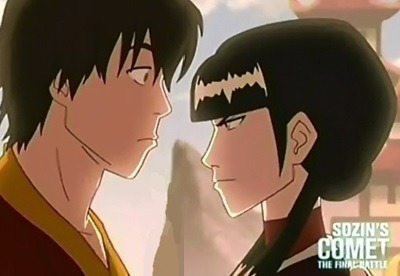
Mai: You need some help with that? Zuko: Mai! You're okay! They let you out of prison? Mai: My uncle pulled some strings. And it doesn't hurt when the new Fire Lord is… not your boyfriend. Zuko: [Gulps.] Mai it’s you, not me. Come back again when you have a personality? Mai: [Deadpans.]
Ah… no Zuko would be killed. RIP new Firelord!
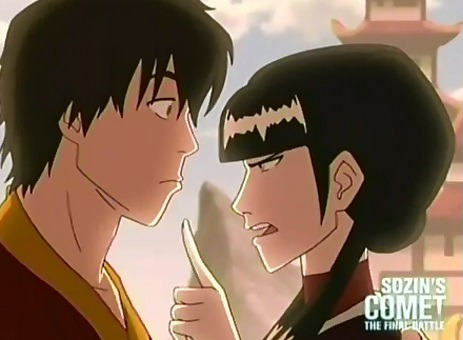
Mai: You need some help with that? Zuko: Mai! You're okay! They let you out of prison? Mai: My uncle pulled some strings. And it doesn't hurt when the new Fire Lord is… not your boyfriend. Zuko: [Gulps.] Mai it’s me, not you. Mai: [Mai's tone and expression changes to a serious and stern one. Finger-points at Zuko’s.] It’s certainly is.
Not amicable…
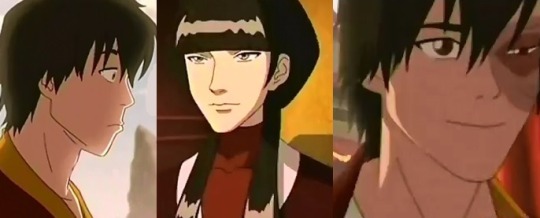
Mai: You need some help with that? Zuko: Mai! You're okay! They let you out of prison? Mai: My uncle pulled some strings. And it doesn't hurt when the new Fire Lord is… not your boyfriend. Zuko: [Gulps.] Mai: [Sighs.] It’s fun while it last. I guess this is goodbye. Let’s do this again some other time.
Perfect… I guess?
See my problem with Zum@i. The writers couldn’t even made a consensus on how to interpret these characters. Every episode in Book 3 equals different writers equals different interpretations. One could argue that it is development and not inconsistency and not one can claim it’s inconsistent just because its new. But notice that in A:TLA Book 3 we could see a characterization consistency on the episodes that was written by the same writer. This was not a problem on Book 1 and 2. I wonder what happened.
Anyways, if they wanted to sell Zum@i, the writers should have taken inspiration from the dim sum up above that usually served as an appetizer. Had they served Zum@i at the start they wouldn’t have a problem with Mai’s inconsistent characterization because you know Mai suffer more from this than Zuko. As I said Book 1 and 2 doesn’t have a problem with inconsistent writing.
Its fine if they served Zum@i at book 3, but they should have shown how it was prepared back in book 2 when Zuko’s backstory and Mai has first appeared. They should have shown the Zum@i childhood crushes they were telling in the comics. I wasn’t even aware of that comic’s existence until this year. Back when I first watch The Awakening, I was just surprised. Then I thought Mai just forced herself to Zuko. Then the next episode, what the heck happened to Zuko. It’s weird. The story is just disjointed.
Mai definitely had a crush on Zuko on the Zuko Alone episode, but there is nothing in that episode or in the whole of Zuko’s backstory to support that Zuko had a crush too. And furthermore, Zuko doesn’t really have any enthusiasm for her since he conveniently forgets about her whenever she isn’t around or isn’t alluded. She’s not even worth a passing thought. He didn’t even have a care what the heck happened to her at the end of The Boiling Rock, Part 2 episode. That’s just… I felt sad for Mai. I felt even sadder for Zuko. Zum@i did both the characters a disservice.
TL, DR: Siomai is made of 30% pork fat to make it soft and 70% other ingredients that made it delicious. You may want to reduce your intake of this food, especially if you already have hypertension. Likewise Zum@i is made of 30% fluff and 70% inconsistent characterization that actually contributed to the fluff. You may want to reduce your exposure to this, especially if you already have hypertension. Just look at how it’s made.
#anti-maiko#anti-zumai#anti-bryke#avatar: the last airbender#a:tla#atla book 3#zuko#m@i#writers fault
14 notes
·
View notes
Text
DUNKIRK
UK/France/Netherlands/US • 2017
DIRECTOR: Christopher Nolan
GENRE: War Epic, Action, Period Drama
FEATURING: Fionn Whitehead, Cillian Murphy, Tom Hardy, Jack Lowden, Harry Styles, Tom Glynn-Carney, Mark Rylance, James D’Arcy, Aneurin Barnard, Barry Keoghan, Kenneth Branagh
MUSIC: Hans Zimmer
RUNNING TIME: 146 mins
Perhaps Nolan’s most ambitious film to date, Dunkirk certainly does not disappoint. Based heavily upon the real life Operation Dynamo of 1940, it tells the story of the mass evacuation of almost 400,000 Allied soldiers from Dunkirk’s beaches against the continuous onslaught of the Germans. It is an epic film relentless in its storytelling and grandiose in scale, with Nolan employing real spitfires and French destroyers, as well as using and ruining genuine Nazi aircraft. The way in which Nolan plays with time in terms of the 3 alternate stories (he chooses to focus on land - ‘The Mole’ - for a week, ‘The Sea’ for a day and ‘The Sky’ for an hour) both mirror the amount of time each would have spent in action and show a true testament to his ability as an innovator.
The bulk of the story follows Tommy, played by newcomer Fionn Whitehead, as he arrives at the beach and tries to find any means possible of getting home, despite being constantly pushed back. Whitehead is supported by acting newcomer Harry Styles, who, despite heavy pressure to succeed in his first acting role following his split from the huge boyband One Direction, does not disappoint. Styles provides a much more realistic view of how soldiers would have felt, desperate to get home and happy to do that by any way possible, even if it is morally wrong. Similarly, Gibson, played by Barnard, reinforces Nolan’s plot of the struggles of the simple soldier and it is these performances that truly highlight what Dunkirk must have been like for the majority. It is no coincidence that Nolan chose to focus upon the Privates, rather than the Generals orchestrating the whole operation, as the audience are left fully aware of the psychological and physical torment these soldiers endured, cultivating a deep and personal connection with the characters on screen

Harry Styles, Aneurin Barnard and Fionn Whitehead on the set of Dunkirk © Daily Mirror, 2016
This torment is heightened by Nolan’s long-time partner Hans Zimmer (Interstellar, Pirates of the Caribbean, Inception) who’s minute attention to detail in his score - he uses Nolan’s own pocket-watch throughout, carefully interweaving it within the suspense-filled music - only increases the tension felt by the audiences. The score itself is a masterpiece, mirroring the despair and anxiety felt by the soldiers, soaring into graceful harmonies which echo the pilots in the sky, only to end up in triumphant harmonies of victory as we see the flotilla of civilian boats arrive at Dunkirk.
The rest of the plot shows Mr. Dawson, played by legendary actor Mark Rylance, his son Peter (Glynn-Carney) and young assistant George (Barry Keoghan) go to Dunkirk after their boat is requisitioned by the navy in order to rescue the stranded soldiers. Similarly, Nolan also focuses upon the role of the RAF pilots in protecting the boats’ crossing, with stellar performances from Tom Hardy and Jack Lowden providing true emotion, whilst for the most part acting with just their facial expressions. There are key characters in Branagh’s Commander of the Navy and Murphy’s ‘shivering soldier’ which show the scope of the danger and the extent of the suffering, and both fully play up to what the role demands of them, something expected of such long-time and skilled performers who’s talent truly shines through here.

Movie Poster © Lite Films, 2016/7
Despite the script only being 73 pages long, and there being very few lines in the whole film, the whole cast spectacularly deliver. The acting heavyweights in Rylance, Branagh and Murphy bring a sense of experience to their roles, whilst the newcomers in Whitehead, Glynn-Carney, Keoghan and Lowden all provide the youthful naivety sullied by war found in so many of the actual soldiers. It results in there being no weak link present; all seem to be acutely aware of the epic story which they are telling and yet all seem to hold a deep level of intimacy with the camera and the audience, allowing for us to become fully immersed in all of their characters, praying for their safe return. For some, the constant over-lapping of time periods may be confusing, and the lack of lines create a somewhat slow-moving film with a lack of plot, and instead create a film which feels like a constant onslaught of incident followed by incident. However, in my opinion, that was Nolan’s whole idea: the actual events would not have been a dramatic adrenaline-fueled hero movie, but rather it would have felt draining and continuous. In that aspect therefore, Nolan chooses to focus more upon reality rather than crafting a talkative action movie, and it pays off in his favour.
The way in which Nolan sustains a stress-inducing and uncomfortable atmosphere truly makes the audience question their own bravery and cowardice and we are left in awe both at the true heroism of the soldiers in 1940 and the skill of the cast and crew in creating such an immersive film. His dedication to create such an authentic atmosphere by using genuine planes and destroyers yet again show his determination to make this as real, and subsequently as harrowing, as possible and it is without doubt how well this pays off on the large screen.
Another small discrepancy which I have is the lack of continuity in the background. This is something to be expected when out upon the temperamental seas for 5 months, with weather clearly differing daily. However, it wold have been nice to see some form attempt of continuity, rather than to have one shot in bright sunshine, only to have the same scene or shot shown from another angle against the backdrop of thunderous clouds. Obviously, this is only a minor issue, and only becomes apparent after having seen the film more than twice, so again it is not a major issue for the audience and rather a minor grievance for eagle-eyed and fussy audience members.
Having watched the film 4 times myself, I can safely say that Dunkirk is, in short, a stellar film which carries the necessity of being seen on the silver screen.
RATING: ⭐⭐⭐⭐⭐
#dunkirk#movie#film#review#christopher nolan#fionn whitehead#harry styles#cillian murphy#kenneth branagh#war#drama#action#mark rylance#world war 2#the select few
2 notes
·
View notes
Text
Volume 4 Chapter 9
a far better episode than volume 4 chapter 8
The Reasons Why Will Shock You!
I want to preface this by retracting something I said previously, which was that Chapter 8 should be the baseline for this volume’s standards. I was speaking from a position of despair, I had allowed myself to lose hope, to lower my expectations, and now I see, yes, I know that I was wrong to do so. RWBY can do better than that, just as it should, and just as it has done this week.
Chapter 9 succeeded because it succeeded at the basics. It managed to comfortably progress the stories and character development of all four protagonists within its timeframe (which was shorter than the episode before it), without feeling like any of their segments were rushed. The dialogue was simple, and it worked. Characterisation was consistent. None of these things are fancy-pants or mindblowing or whatever - this was as Solid an episode as a Solid Episode should be.
In light of what had come before it, Solid is positively magical.
The largest quartz-like point of rock salt i was able to mine yesterday came from Taiyang and Yang’s scene. I take increasing umbrage with Taiyang’s wavering characterisation, and here I’m not sure how much of that is delivery/direction and how much is the script itself. Others with more investiture in examining RWBY have gone into great detail on a number of glaring issues - the fact that Taiyang is straight-up wrong about Yang’s usage of her Semblance in the tournament, and also about the strengths/flaws portrayed thus far in her character (the ones he picks out apply far more to Ruby) - and we have yet to see whether these discrepancies are due acknowledgement by the narrative.
I still found it a pretty touching scene, particularly Yang catching Tai at the end of their bout. Tai talking about Raven in such a gentle and complimentary fashion was also something that I didn’t expect so soon but found very welcome, I’m always on board for that. More than anything, Yang being happy and functional and having the space to grow? Good stuff.
Weiss’ scene was succinct, visually powerful and effective. As exemplifed by the White Trailer, as a character she seems to do best when her environment is a simple one - in this case a giant window looking out onto an empty sky, a well-placed image of the Schnee Knight, sufficient raised floorspace and a door on the level just below it. Every one of these focuses was acknowledged and used by the camera to lend emotional meaning to her successful, and controlled, summoning. The window breaking in particular struck me as something conceptually intertwined with Weiss and the Schnees from the very beginning of the show, without ever having been shown on-screen before.
Whitley also recieved the characterisation we should have seen from the start, and in very few lines. There are two possible plot implications to his interaction with Weiss: either he has simply not undergone the Hunt training that his sisters have (and nor has their father), OR in addition there is power limited to the Schnee women that is off-limits to the men of the family, even those connected by blood. The fact that the camera paid close attention to Whitley’s inside-of-a-glacier eyes - the same colour as his father’s and quite different to the softer shades of blue his sisters and mother exhibit - makes me suspect the latter. Witchy white-haired ghost women~
(Still no sign of Myrtha Queen Of The Wilis Willow Mama Schnee, please report to lost and found)
In Menagerie Sun and Blake went back to the roofs (what is it with them?) to chase a chameleon lady - who of all the new characters seems to have the most RWBY-like design. Her hair is like a curling chameleon tongue, her sword-whip weapon is... also like a chameleon tongue, she can change the colour of her skin and hair like her body’s a discotheque - it’s good. It’s a villain that suits the RWBY universe. You go, Sister Ilia. She did manage to seriously injure Sunny-boy, and this short-but-effective (you see, RT?!) scene leaves Blake feeling very upset.
And finally, the Every Man In RWBY Likes Men scene. Fresh from engorging himself on too many cartons of Vimto, Qrow’s moaning for “Tai” (well, okay, having semi-conscious flashbacks to telling Tai that “she” is not coming back, and it could be either of the STRQ ladies but I have my money on Summer) while the children he helped put in danger are looking for some sort of apothecary. They needn’t worry. Qrow proooobably ain’t dying yet, not when he’s got so many plot strings hanging loose.
More important than a sickly old guy is the Jaune/Ren Hug. I joke about gay subtext and shit because I’m a thirsty lil queer, but what was enormously heartening about this hug was how it was framed. No “no homo” jokes. No attempt to lighten the mood. Just two friends, both quietly thinking about the chance that they won’t see each other again, taking a few seconds to hug it out. The camera does nothing but observe from the side. It’s emotional, it’s genuine and it’s exactly the kind of interaction I hope for in a show like RWBY. Guh. GUH.
I’ve written an awful lot about this episode, which I think speaks to its quality relative to what we’ve seen so far. It’s no masterpiece, but I’m not asking for one. This is the standard I would hope Volume 4 was meeting week after week. It’s clear that the writers can do it - they can use actions instead of words, they can be tonally appropriate, they can be simple. I’m proud of them. I enjoy Good RWBY, I don’t like gagging on salt.
But hey. We’ll see what’s in store next week.
2 notes
·
View notes
Text
Don’t Panic: 14 Underappreciated Douglas Adams Quotes for Writers, the Universe and Everyone
Here author Douglas Adams poses holding a copy of the book which has “Don’t Panic” written on the front cover. 29th November 1978. (Photo by Daily Mirror/Mirrorpix/Mirrorpix via Getty Images)
“Let us think the unthinkable, let us do the undoable, let us prepare to grapple with the ineffable itself, and see if we may not eff it after all.”
– from Dirk Gently’s Holistic Detective Agency (1987)
To all you hoopy froods out there: Today is the anniversary of the day The Hitchhiker’s Guide to the Galaxy hit bookstores 1979—and to sweeten this glorious day, it was just announced that the Hitchhiker series is in line for a radio reboot that will hark back its origin as a radio special.
While Douglas Adams’ satirical space jaunt never grows old, everyone’s heard about towels and unfortunate flower pots and dozens of other quotes from the Guide a dozen times over. But there’s so much more he wrote and said that’s worth absorbing, which is why we’re celebrating this auspicious day with a few wisdoms you might not remember—or that you may not have read at all. (And most of them are particularly poignant for writers too.)
So grab your towel, put down your Vogon poetry and dive into these impeccable Douglas Adams quotes about media, information, life, technology and more.
14 Underappreciated Douglas Adams Quotes for Writers (and Everyone)
1. For when you’re feeling unimaginative:
“Anything can be real. Every imaginable thing is happening somewhere along the dimensional axis. These things happen a billion times over with exactly the same outcome and no one learns anything. Whatever a person can think, imagine, wish for, or believe has already come to pass. Dreams come true all the time, just not for the dreamers.”
— from And Another Thing … (2009)
2. For when your plot takes you somewhere you weren’t expecting:
“… my methods of navigation have their advantage. I may not have gone where I intended to go, but I think I have ended up where I needed to be.”
— from The Long Dark Tea-Time of the Soul, Ch. 13 (1988)
3. For when you’re pondering the mystery of life:
“For us, there is no longer a fundamental mystery about Life. It is all the process of extraordinary eruptions of information, and it is information which gives us this fantastically rich, complex world in which we live; but at the same time that we’ve discovered that we are destroying it at a rate that has no precedent in history, unless you go back to the point when we are hit by an asteroid!
— from “Parrots, the Universe and Everything” a talk at the University of California, Santa Barbara—Adams’ final public appearance before his death in May 2001
4. For when you’re in need of a different perspective:
“He was constantly reminded of how startlingly different a place the world was when viewed from a point only three feet to the left.”
— from The Salmon of Doubt: Hitchhiking the Galaxy One Last Time (2002), Random House
5. For when you’re having trouble working out that troublesome inconsistency in your narrative:
“Solutions nearly always come from the direction you least expect, which means there’s no point trying to look in that direction because it won’t be coming from there.”
— from The Salmon of Doubt: Hitchhiking the Galaxy One Last Time (2002), Random House
6. For when you need a fun fact … or two:
“I’d take the awe of understanding over the awe of ignorance any day. My favorite piece of information is that Branwell Brontë, brother of Emily and Charlotte, died standing up leaning against a mantelpiece, in order to prove it could be done. This is not quite true, in fact. My absolute favorite piece of information is the fact that young sloths are so inept that they frequently grab their own arms and legs instead of tree limbs, and fall out of trees.”
— from The Salmon of Doubt: Hitchhiking the Galaxy One Last Time (2002), Random House
7. For when you’re on the hunt for ideas:
“So where do the ideas actually come from? Mostly from getting annoyed about things. Not big issues so much … as the little irritations that drive you wild out of all proportion.”
— from the introduction to The Frood: The Authorised and Very Official History of Douglas Adams & The Hitchhiker’s Guide to the Galaxy
8. For when you’re worried about the future of printed books and media:
“It’s important to remember that the relationship between different media tends to be complementary. When new media arrive they don’t necessarily replace or eradicate previous types. Though we should perhaps observe a half second silence for the eight-track. — There that’s done. What usually happens is that older media have to shuffle about a bit to make space for the new one and its particular advantages. Radio did not kill books and television did not kill radio or movies — what television did kill was cinema newsreel. TV does it much better because it can deliver it instantly. Who wants last week’s news?”
— from The Hitchhiker’s Guide to the Future (2001), a BBC Radio 4 program on how new media and technology will change our lives
9. For when you’re working on a deadline:
“I love deadlines. I love the whooshing noise they make as they go by.”
— from The Salmon of Doubt: Hitchhiking the Galaxy One Last Time (2002), Random House
10. For those looking to avoid clichés in their writing:
“One of the things Ford Prefect had always found hardest to understand about humans was their habit of continually stating and repeating the very very obvious, as in It’s a nice day, or You’re very tall, or Oh dear you seem to have fallen down a thirty-foot well, are you alright? At first Ford had formed a theory to account for this strange behaviour. If human beings don’t keep exercising their lips, he thought, their mouths probably seize up. After a few months’ consideration and observation he abandoned this theory in favour of a new one. If they don’t keep on exercising their lips, he thought, their brains start working. After a while he abandoned this one as well as being obstructively cynical.”
— from The Hitchhiker’s Guide to the Galaxy
11. For when you’re questioning reality:
“‘How can I tell,’ said the man, ‘that the past isn’t a fiction designed to account for the discrepancy between my immediate physical sensations and my state of mind?’”
— from The Restaurant at the End of the Universe (1980)
12. For those times when you realize you’ve evolved as a writer:
“They were not the same eyes with which he had last looked out at this particular scene, and the brain which interpreted the images the eyes resolved was not the same brain. There had been no surgery involved, just the continual wrenching of experience.”
— from So Long and Thanks for All the Fish (1984)
13. For when you’re feeling out of touch with new technology:
“I’ve come up with a set of rules that describe our reactions to technologies: Anything that is in the world when you’re born is normal and ordinary and is just a natural part of the way the world works. Anything that’s invented between when you’re fifteen and thirty-five is new and exciting and revolutionary and you can probably get a career in it. Anything invented after you’re thirty-five is against the natural order of things.”
— from The Salmon of Doubt: Hitchhiking the Galaxy One Last Time (2002), Random House
14. For when you’re crafting a story with an unsual timeline:
“Anything that happens, happens. Anything that, in happening, causes something else to happen, causes something else to happen. Anything that, in happening, causes itself to happen again, happens again. It doesn’t necessarily do it in chronological order, though.”
— from Mostly Harmless (1992)
Scare and Share Alike: Writing and Selling Horror Fiction Live Webinar
The post Don’t Panic: 14 Underappreciated Douglas Adams Quotes for Writers, the Universe and Everyone appeared first on WritersDigest.com.
from Writing Editor Blogs – WritersDigest.com http://www.writersdigest.com/online-editor/douglas-adams-quotes-hitchhikers-guide-to-the-galaxy
0 notes
Text
Anime Review: Erased
[Review submitted by http://hawk-in-a-jazzy-hat.tumblr.com/]
Originally posted on 25/03/2016
This review is a personal opinion and does not necessarily reflect the views of the committee or the society in general.
Satoru Fujinuma really wants to write manga, but his attempts keep getting rejected due to not having enough of his own heart in them. Unable to find the inspiration, Satoru finds himself working a part-time pizza delivery job, but he has other things on his mind as well. Namely, the fact that he keeps undergoing “Revival”; being sent back a few minutes into the past in order to prevent an imminent disaster. However his life suddenly takes a turn for the worse, and he finds himself being revived way, way into the past; back into his elementary school days. Reuniting with his old school friends, he figures he has a chance to prevent a disaster from his childhood; a disaster which, if averted, may just change his life forever…
Adaptations are tricky beasts. No matter what you do, you’re always going to get people going “but the original was better because it did it first”. Incidentally, I stand by my belief that all work stands on its own feet, adaptation or not, and if something is a unique story in its own medium then it deserves to be looked at as such. Some film adaptations are better than their books, some books are better than their films; there’s no one rule as to what makes something “better”. But that’s a rant for another time. What I will talk about is the nature of adapting a manga into an anime, and what that entails.
See, the Erased manga is an 8 volume series standing at 44 chapters, which finished this year. It was adapted into a 12 episode series to be released during a single season (a season of anime lasts for about a quarter of the year). This immediately causes discrepancies with timing, pacing, where to split the chapters; film is a very different medium to comic, since some pages only take a few seconds (action scenes), while others will take several minutes (character discussions). Also bearing in mind that you might need to add or take away things, and you can probably see why adaptation is so difficult. Luckily the Erased manga was due to finish at the time when the series was airing, so at the very least the series ending is actually the “true” ending. (Again, another rant about the stigma of anime-only endings another time)
So given all that, what, you’re probably asking, do I think of Erased? Honestly, it’s great. It’s got a really unique concept and the first episode is incredible, setting up a dark, mystery thriller. The next few episodes add even more layers, taking place in the past and adding several beautiful character moments.
Easily the highlight of this series is the arc revolving around the main schoolgirl character, Kayo Hinazuki. Her relationship with Satoru takes up most of the series and it is beautifully done. For one thing, the kids in this series actually act like kids. It may not sound much, but trust me, it’s so rare to find great, believable child characters in any piece of fiction. None of the child cast come off as annoying or bland or grating, not even the catty ones. The segments in the past really felt like a nostalgia trip, and props to everyone involved in writing and acting that. I also want to give a shout-out to Satoru’s mother, who may be hands down the best mother I’ve seen in anime period.
Another plus is the presentation by A-1 Pictures; every frame of this looks utterly beautiful. Characters are always on model, the designs actually look semi-realistic without looking ugly, and the facial animation is leagues above what I’d expect for anime. The direction’s really solid as well, with clever composition and editing creating some beautiful and tense moments, and even sometimes saving the scenes which are, let’s say, not quite as well written.
Now, this series follows the basic story of the manga, but a lot had to be cut out. But herein lies the real problem with this series, and why I was harping on about adaptation earlier; in order to make a good adaptation, you need to mould the whole series to your new medium. If something needs to be taken away, then you need to actually write it out completely. Conversely, if you need to fill time and add something in, make sure it completely fills the gap. (Which can be done well; this is one reason why I actually for the most part like the Hobbit movies). Erased has a lot of story, and has a lot of plot threads and characters to get that story across, but the thing is, the anime is not given enough time to explore them. Hence while it does wrap up the main plot, technically, there are a load of extra characters and sub-plots that are either completely rushed or just don’t go anywhere.
They’re not bad characters, they really aren’t, but they just feel so superfluous. It really feels like this should have been a 24 episode series. In fact, I was convinced it was going to be until the last three episodes, which are probably the worst of the series in terms of pacing. And again, they’re not bad episodes; they’re tense, they’re emotionally driven, they focus on the right things and the ending itself is satisfying. But as well as they did manage to fit in all this stuff they could have done so much more if they’d just taken out some of the fluff. The present day stuff and pretty much all the characters there, and maybe a few of the other schoolkids could all have been cut, and we could have spent some more time developing others, particularly Kenya and Yuuki who in the end were both desperately lacking despite both being interesting.
Having now watched this for a second time, I can pinpoint the series’ flaws down to another issue, again probably due to the adaptation; from the beginning, Erased sells itself as a mystery and a thriller. The direction, the concept; everything lends itself to high-concept tension. But the thing is, when you really get down to the story…it’s not a mystery. It’s a drama, and it’s a character study, and when the show actually focuses on that, it’s really fantastically good. But that just makes the deficiencies stand out even more when it tries to push the mystery angle at you, which may be somewhat realistic but in many ways completely kills the tension. I feel the series could have saved itself if the big ‘reveal’ as it were had been at the halfway point, rather than close to the end. Erased is a far more engaging story when it’s dealing with the ‘how’ rather than the ‘who’, and given the final confrontation of the series, I’m convinced that’s what the story was trying to do; it’s certainly more akin to a clash of ideals than a big Phoenix Wright ‘blowing open the case’ story, which in this context just falls flat.
That’s the saddest thing about this series for me; I want to love it so badly. It has so many wonderful things going for it; great animation, wonderful characters, a thrilling mystery and beautiful emotional beats, all the way through. But if you’re going to tell this story you need to tell it properly, and the adaptation here was overall just so sloppy. Either double the series length, or if that’s really not possible, then cut out bits and shorten the story. Yes it’s difficult, and it’s sad to lose great stuff, but it’s even sadder to be shown great stuff and then never actually having anything done with it. Let me put it this way; I’d much rather be able to build a small Lego set than get sporadic glimpses at a huge one.
With all that said and done, this is still a great series. It definitely rises above my recommendation line (between 6 and 7) and has an awful lot to love, particularly in the first half. With all that said though, despite nearly everything else being near perfect I can’t call this a true classic. It clearly wants to be, and I seriously wanted it to be, but that’s the nature of adaptation. You can have the greatest story in the world, but if you don’t tell it right, then you are losing so much more than you realise.
My score: 7/10
0 notes